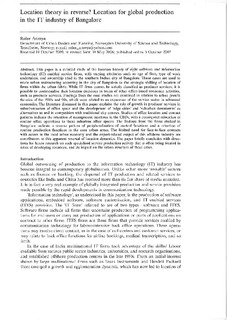| dc.contributor.author | Aranya, Rolee | nb_NO |
| dc.date.accessioned | 2014-12-19T11:21:24Z | |
| dc.date.available | 2014-12-19T11:21:24Z | |
| dc.date.created | 2008-01-30 | nb_NO |
| dc.date.issued | 2007 | nb_NO |
| dc.identifier | 123401 | nb_NO |
| dc.identifier.issn | 1472-3409 | |
| dc.identifier.uri | http://hdl.handle.net/11250/230992 | |
| dc.description.abstract | This paper is a detailed study of the location history of eight software and information technology (IT) enabled service firms, with varying attributes such as age of firm, type of work undertaken, and ownership sited in the southern Indian city of Bangalore. These cases are used to relate urban restructuring occurring in the city of Bangalore to the strategic shifting of location of firms within the urban fabric. While IT firms cannot be strictly classified as producer services, it is possible to contextualise their location decisions in terms of other office-based economic activities, such as producer services. Findings from the case studies are examined in relation to urban growth theories of the 1980s and 90s, which were related to an expansion of the service sector in advanced economies. The literature discussed in this paper explains the role of growth in producer services in suburbanisation of office space and the development of `edge cities' and `suburban downtowns' as alternatives to and in competition with traditional city centres. Studies of office location and contact patterns indicate the retention of management functions in the CBDs, with a consequent relocation of routine office operations to these suburban office spaces. The findings from the firms studied in Bangalore indicate a reverse pattern of peripheralisation of control functions and a retention of routine production functions in the core urban areas. The limited need for face-to-face contacts with actors in the local urban economy and the export-related output of this offshore industry are contributors to this apparent reversal of location dynamics. The paper briefly concludes with directions for future research on such specialised service production activity that is often being located in cities of developing countries, and its impact on the urban structure of these cities. | nb_NO |
| dc.language | eng | nb_NO |
| dc.publisher | SAGE | nb_NO |
| dc.title | Location theory in reverse? Location for global production in the IT industry of Bangalore | nb_NO |
| dc.type | Journal article | nb_NO |
| dc.type | Peer reviewed | nb_NO |
| dc.source.journal | Environment and Planning A: Economy and Space | nb_NO |
| dc.identifier.doi | 10.1068/a38416 | |
| dc.contributor.department | Norges teknisk-naturvitenskapelige universitet, Fakultet for arkitektur og billedkunst, Institutt for byforming og planlegging | nb_NO |
